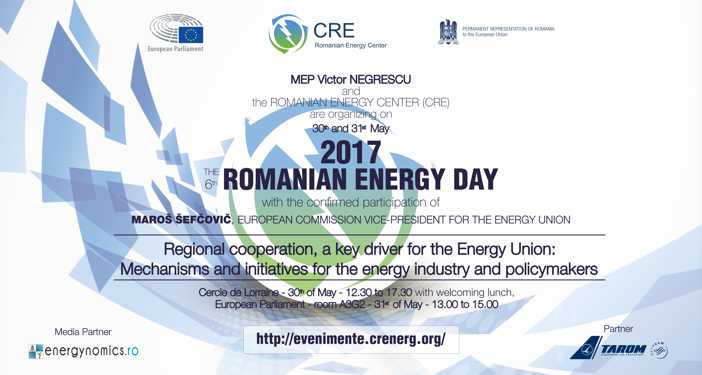“Regional cooperation, a key driver for the Energy Union: Mechanisms and initiatives for the energy industry and policymakers”organised by the Romanian Energy Center (CRE)
30-31st of May 2017, Brussels
Organized in cooperation with the Permanent Representation of Romania to the European Union and MEP Victor Negrescu, the 2017 edition enjoys the participation of Maroš Šefčovič, European Commission’s Vice-President in charge of a Resilient Energy Union with a Forward Looking Climate Change Policy.
Until recently, Central and South-East Europe has not been involved in the European policy-making process. Its geopolitical vulnerabilities and the persuasive bottlenecks in the energy market have made a case for boosting regional cooperation. New mechanisms and initiatives for cooperation have empowered the Member States to work towards fulfilling their energy and climate commitments and make the Energy Union work to their benefit.
On the 30th of May in the exquisite premises of the Cercle de Lorraine in Brussels, energy industry representatives will have the chance to debate:
- CESEC 2.0 or how to maximize RES integration through infrastructure
- Mitigating energy poverty through energy efficiency in Central and South-East Europe
- Diversifying supplies and routes for an improved energy security in the Central and South-Eastern European region
- Energy services companies’ digital path to energy transition
Following a full day of industry discussions regarding Mechanisms and initiatives for regional cooperation, the policy module foreseen for the 31st of May in the European Parliament aims at showcasing the policymakers’ efforts to address the challenges in creating an integrated and fully functioning energy market in the form of the newest initiative dedicated to all Europeans: the Clean Energy Package.
More information regarding the timing and the agenda are to be found in the conference webpage.
The Romanian Energy Day 2017 will bring together key representatives energy policy makers at national and EU level, representatives of the European Commission, Members of the European Parliament, representatives of professional associations and energy companies active in Brussels and all those interested in understanding the Central-Eastern European energy market.
